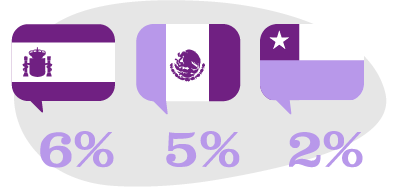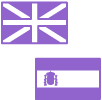How to choose your translator
Hiring a translator, whether your business is big or small, is a paramount aspect of your communication strategy.
It can help you expand to new markets, reach new audiences, stand out from your competitors, connect with readers beyond your language scope, and, who knows? You might even become a bestselling author in a different language. Ultimately, translation is a wonderful ally to increase your profits.
Now, when it comes to choosing a professional language service provider, i.e., a translator, there are important aspects to keep in mind.

What’s your target language?
Two key concepts within the translation industry:
- Source language: the original language a text was written. If you speak English, for example, and all you communication is in English, then that’s your source language.
- Target language: the language you want your content to be translated into. For example, Spanish, French, Italian, German, etc. Following the example above, any language that is not English.
Now, we know that for years, English seems to have become THE international language.
However, when it comes to communicating relatable content (and specifically, when you’re trying to convert to sales), it seems a wise choice to turn to your reader’s native language.
I know… you must be thinking:
- It’s far away from my language perspective.
- In general, information is culturally different.
- I’m not able to find collaborations for education because I don’t speak a second language.
- I speak a second language but not confidently enough to publish in it.
- It’s going to take forever for me to learn another language!
Let me show you some numbers about our native language, Spanish.
- Spanish is the official language in over 20 countries. It is the second language with most native speakers in the world.
- Did you know that Spain is not even within the top 10 countries of Europe with good level of English? On the other side of the ocean, Latin American countries rank quite low on the list of countries with good command of the English language.
In Spain, only 6% of the population can speak English fluently. In Mexico, just 5% of the population can speak English and in Chile, only 2%.
Now, let’s imagine that you’re trying to sell a book.
If only 0.5% of these people were potential buyers of your book, that means 115 thousand potential customers that you might be missing out on because of a language barrier.
And again, if only 0.5% of those potential buyers actually buy your book (or online course, or contribute to your blog or social media), we’re still talking about 575 products sold.
Pretty great, uh?

You can achieve this without the need to speak Spanish (or any other language) fluently.
- You don’t need to spend endless hours trying to learn a new language proficiently to be able to publish in it.
- You don’t have to suffer and go through a frustrating process that you don’t fully understand.
There are professionals who can help you take your message to an audience that, currently, seems galaxies away from your language perspective. Reach out to them!
Why your content is overlooked
You might be surprised by the low number of people creating content in a language other than English.
The Spanish-speaking community who cannot fully understand English is definitely missing out on valuable information because there aren’t so many authors publishing in their native language.
Can you blame them?
Information is power, we are all aware of that. But, how can your audience feel empowered when they can’t understand what you’re saying?
Choosing your translator
Choosing your translator is pretty much like choosing a pair of shoes.
Shoes can:
- be expensive, affordable or cheap
- come from prestigious or unknown designers
- be well or poorly branded
- make you feel like you belong
But let’s face it: if they don’t fit, you will never wear them…

Finding a professional translator or language service provider is a task that ultimately has to fit your needs.
Here are some tips you can follow:
- Niche. It will make things a lot easier to work with someone who knows what you’re talking about. Find a translator who specializes in your niche.
- Fluent communication. You will probably have questions about the whole process, so you must find someone who will be there to answer all of them.
- Reliable. Your content is your most valuable asset, and you don’t want it to be spread without your consent. Find a translator who will respect confidentiality.
- Honesty. It’s hard enough to let go of your writing. Your translator has to be honest and true to your original creation.
Just like Steve Jobs once said, “Great things in business are never done by one person; they’re done by a team of people.”
Working alongside your translator
Once you’ve chosen your language service professional, you can start working together. And please — remember that you’re now dealing with a professional. This person is neither Google nor software. Even though she will solve your language problems and make your life easier (ultimately), you are always welcome to be involved in the process. Ask questions and be ready to answer questions from your translator.
From experience, I can give you this piece of advice: keep an open mind. Different cultures communicate things differently. A funny meme in one culture can be awfully disrespectful in another.
Your translator may have to introduce some changes in the target text to communicate exactly what you meant. Be ready to study those changes and try to be as open as you can. No one likes literal translations that sound robotic.
If you want your text to have an impact in your target audience, then you have to be ready to work on the cultural differences. Even within the same language (like Spanish), there are innumerable variations according to geographical areas. Allow your translator to take care of that.
If you liked what you read, and you’re considering using translation as a tool to get to more and more readers, then we might be a perfect fit!

Hi there! I’m Ariadna, from ariadnatranslations.com
I’m here to share some thoughts and ideas about my job as a translator. I love writing about language, women/feminism, health and wellbeing, among other interesting topics. If you liked what you read above, I invite you to comment and share it on your social media.